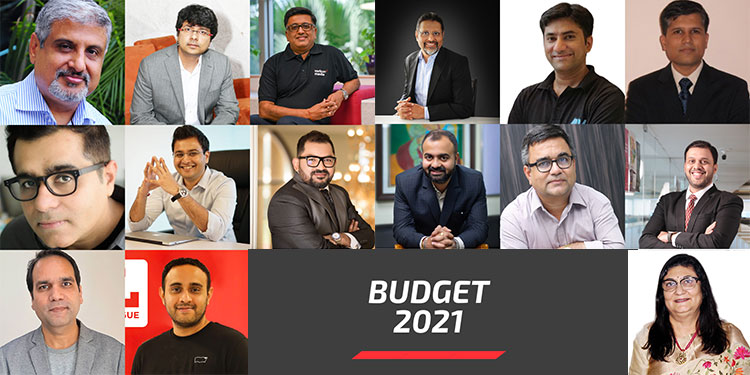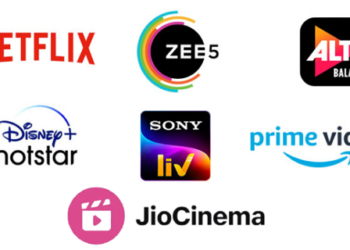The Union Budget coming in the wake of COVID 19 has been given thumbs up by the industry. There is a huge boost for healthcare, infrastructure, Start-ups, Education Sector and Insurance. This will in turn increase spends and also bring in a positive consumer sentiment.
We spoke to Industry stalwarts in Media, Start-ups, Brands, Healthcare and Edutech.
Anand Bhadkamkar, CEO-India, dentsu.
It is definitely a growth-oriented budget. The Finance Minister has done an excellent job and has made sure that there is no increase in taxes. The disinvestment of PSU banks, LIC, consolidation of SEBI Act, etc. are the right steps ahead and we need to see how she will deliver on that aspect.
What really impressed me about this budget are the six Pillars – one of which is minimum government and maximum governance, which is also very important in the corporate world. The budget intends to bring liquidity into the economy, focus on Infrastructure and offer tax holiday for start-ups, giving the MSME a higher outlay.
Another beneficial move is the tax relief offered to senior citizens, which is excellent administratively. Insurance and Healthcare have been given a huge boost. Similarly, easing of business rules for NRIs is a step in the right direction. Instead of taxing the taxpayer, the Finance Minister has ensured that the revenue comes from smarter allocation of available resources and better tax management. As a salaried person, I would have liked more benefits. However, aforementioned, we expected positive consumer sentiment to be created by the budget and I am optimistic that this budget is going to do so. The budget aims to bring down the fiscal deficit; and largely sectors like Infrastructure, healthcare, education, Automobiles etc. are seeing positive momentum.
We expect the spending to accelerate; witness positive growth in terms of spends coming in, and consumer sentiments returning. If you see the social sector from an economic growth perspective, which needs to be pushed from the grass root level, this budget is providing the same with infrastructure development. This can lead to a domino effect for development. Likewise, from the advertising sector perspective, the feeling is similar. Though there are multiple factors involved. If you go category-wise such as FMCG, Consumer Durables and Auto, there is positivity and we expect spends from them.
Mobiles are likely to get costlier. But the government has given more relief to domestic industries to support AtmaNirbhar Bharat. For the Media & Advertising industry, it is a growth-oriented budget that is likely to support growth in advertising and marketing spends as well. Overall, I would rate this budget a 9/10.
Anurag Bansal, Chief Operating Officer & Chief Financial Officer, DDB Mudra Group:
The biggest good news coming out from this Union Budget is no negative tax on corporates as well as individuals and no Covid cess. With the big push on infrastructure and healthcare spending, corporates in these sectors stand to gain. Raising resources without increasing taxes, powered by massive borrowings are the key highlights of this Union Budget. It will enable the Government to invest in growth impulses leading to structural changes in the economy. This will help in capital formation in real assets and demand generation. The time limit to reopen tax assessments is reduced to 3 years from 6 years, coupled with ease of tax compliance, which will simplify business challenges.
Overall, Indian economy’s recovery from the impact of Covid-19 has been much better than expected, leading to a spectacular bounce back in consumer sentiments. Advertising and media stand to gain as the economy picks up momentum and clients resume their spends. And with the focus of Budget 2021 on capital expenditure and nation building, it augurs well for consumers, markets and businesses.
Chetan Asher, Co-founder & CEO, Tonic Worldwide – a digital-first creative agency
The budget as expected is focused on reviving the economy. Increased spends in infra projects and focus on health, it delivers on both. Focus on promoting digital payments and not losing the momentum will only grow the digital ecosystem. Tax holiday for start-ups will give impetus to innovation.
Kunal Lakhara, VP of Finance and Operations, Pocket Aces. (Start-up and Digital entertainment sector)
The Union Budget 2021-2022’s revised fiscal deficit estimate for FY21 which is pegged at 9.5% of GDP seems promising, and has taken on a realistic approach that is focused on spends which are much needed to revive the economy. The tax holiday given to start-ups for an additional one year brings relief to enabling the sector to sustain and grow, as we recover from the pandemic. Furthermore, the move to encourage one-person companies without any restrictions is a step in the right direction. This will go a long way in encouraging more people to come forward to set up innovative businesses that solve the challenge of the day, and grow the high-potential start-up ecosystem within the country.
Nikhil Rungta, Country Manager, India, Verizon Media.
This is a ‘get well’ budget with an expansionary outlook and focused on growth. Given the times it might not be a radical budget, but it is practical and thoughtful, which will propel consumption and growth of business. This budget has also rightly signalled the need for greater inclusion in India’s workforce. Women being allowed to work in all sectors and in night-shifts with adequate protection, and social security benefits extended to gig workers will provide an impetus for women to step up their contribution towards Aatmanirbhar Bharat.
Rohan Bhansali, Co-Founder & Director, Gozoop
While I would not term it as a ‘Never Seen Before Budget’, the good news is that there were no negative surprises for the corporate, startup as well as digital India. The FM further the commitment towards Digital India by announcing India’s first Digital census. While there were a lot of encouraging macro narratives of disinvestments, infrastructure, NCLT strengthening, etc., perhaps the biggest takeaway was that the budget speech was delivered by the Finance Minister on a ‘Made in India’ tablet. The medium itself was a message. A message of a more confident, self-reliant, and digitally-led India.
Neeraj Tyagi- Founder and CEO, We Founder Circle- startup investment platform
The funding in the start-up ecosystem has been dry in the last one year. To support the community it was imperative to attract investors. Extension of capital gains exemptions on start-up investments and allowing NRIs to establish OPCs are two announcements that might water the dry field for entrepreneurs. This will also widen the possibilities for start-up investment platforms that used to scout for angel investors outside mostly. This is going to make domestic investments market healthier.
Dinesh Chhabra, CEO, Usha International
We welcome this Budget, India’s first post-COVID budget, which is expansionary and focuses on the nation’s growth, bringing a positive sentiment to the overall economy. Strengthening the healthcare facility of the country is the need of the hour and it’s heartening to see the Government’s commitment to the welfare of the society. The Government’s announcement on providing financial incentive to promote digital mode of payment will further boost the ‘Digital Revolution’ in India and is tailored to further accelerate growth rate. Furthermore, the exemption duty on steel and copper scrap, up to March 2022, will also help control the rise in price of consumer goods that will translate into healthy sales in the coming summer season. Giving a boost to agriculture and rural on the one hand and the MSME sector on the other will go a long way in strengthening the India we want to build. We are confident that the budget allocation for FY 2021-22 will provide the much needed thrust to the V-shaped growth trajectory of Indian economy. This budget clearly indicates the Government’s intent on rebuilding a new India.
Jatin Ahuja, Founder and MD of Big Boy Toyz
This year’s budget has made some valuable developments in building a strong domestic market for the automobile sector. The kind of financial support that the sector has received, including approx. INR 57,000 crores for auto and auto components and 1.08 lakh crore to MoRTH for capital is remarkable. Other than this, increased expenditure on building road infrastructure to support the sale of commercial vehicles, voluntary scrappage policy, and Research & Development, look promising for the automotive sector. Also, the increase in the customs duty on some auto parts by 15% along with PLI scheme seems to be a favourable step towards building an independent nation.
Sai Srinivas, Co-founder and CEO, Mobile Premier League (MPL)
Government’s budget announcement has been extremely encouraging for the start-up ecosystem in India. The extended exemption on capital gains for investments will definitely make more funds available for budding entrepreneurs and growing organizations alike.
Digital payments infrastructure has played a very important role in the growth of the mobile gaming industry. It is very encouraging to see the government’s efforts to strengthen digital payments through incentivization. The Rs 1,500 croreboost will further support migration of more people towards digital payments and will have a positive impact on the mobile skill gaming industry.
The incentivizing of one person companies is especially heartening as it promotes the development of more game creators that will help in strengthening the gaming industry in India. The move has also allowed conversion of one-person companies to any other kind, reducing residency limit from 182 days to 120 days.
India is at the cusp of creating a wave of mobile gaming unicorns, these measures only support that momentum. With these announcements acting as winds in our sails the Indian Gaming Industry can aspire to be the Global Hub of game development.
KE Ranganathan, Managing Director, Roca Parryware:
“Our Hon’ble FM has given the near-perfect ‘Vaccine’ to the Economy for faster recovery. The ‘jab’ will be very effective as seen from the huge jump of +35% in Capex spending and the fiscal deficit widening from 6.8% to 9.5. Indeed a bold step to pull the demand side up through these higher allocations for spending.
The ‘Jab’ will spread to all parts of the Economy body: agriculture getting a big target of 17 lakh Cr funding, urban infrastructure, railways and roadways a major chunk of over 3 lakh Cr allocation, affordable housing with tax breaks, Swacch Bharat with 1.15 lakh allocation, textile getting a big boost etc. On the people side good to see GIG / Platform workers getting protected with better social security benefits. Relief for senior taxpayers from filing returns is in the right direction.
Overall the health of the Indian economy will re-bound faster with this well thought out vaccine.”
Saugata Gupta, MD and CEO, Marico Limited.:
With the announcement of the Union Budget 2021, the Honourable Finance Minister has taken the monumental task of providing stimulus to consumer demand as well as taken the economic environment head-on, aiming for a fiscal deficit of 6.8% of GDP whilst not making any major change in the taxation structure. Considering the challenges at hand in the face of the pandemic and the slowdown pre-Covid, the budget is well balanced, focusing on key measures including a clear spending focus on health care, vaccination and development of physical infrastructure. It prioritises spending to revive the economy after an unprecedented crisis, despite limited fiscal headroom, which is certainly a big positive step, and will aid the industrial sentiment in India greatly. It has also detailed out inclusive development plans for the agricultural sector and this should help in sustaining the momentum of rural growth.
Overall, this Union Budget ticks most of the right boxes with an encouraging capital infusion in infrastructure and funding the same through prudent borrowing, divestment and restructuring of allocations without impacting consumers negatively. I believe that, going forward, this will bode well for generating demand, driving consumption and sustaining the growth momentum needed to revive the economy.
Dr. Minnie Bodhanwala, CEO Wadia Hospitals
The Budget 2021 does recognize the immediate needs for the COVID-19 pandemic and the vaccine requirements for the nation. The focus on spending on COVID measures and the vaccines will bring the much needed stability to the Public Healthcare setup. The increase in budget outlay for health and welfare by 137% as compared to the previous year will boost the public health and pharmaceuticals sector.
The PM Aatmanirbhar Swasth Bharat Yojana to develop capacities of health care systems, develop institutions for detection and cure of new and emerging disease is the first step to boost rural health and keep country ready for emergency handling of pandemic situations. The Government will need to continue to invest in the development of human resources and infrastructure in the years to come.
The decision to include the Pneumococcal vaccine is also a welcome decision, along with the announcement of Mission Poshan to improve nutritional outcomes for children.
With the Budget 2021, the Government has taken a much-needed step to be moving in a direction of strengthening healthcare and promoting preventive healthcare. A robust monitoring and implementation plan in place will he see the initiatives achieve great success.
Dr. Chenraj Roychand – Chairman, Jain Group
The budget 2021 brings with it good tidings for the education sector. The highlight being the announcement of establishing 100 new Sainik schools in partnership with NGOs and other private academies and setting up of Central University at Ladakh. Finance Minister NirmalaSitharaman has also asserted that more than 15,000 schools will be quantitatively strengthened, which gives great impetus to the education sector. The announcement of the legislation for an umbrella body of higher education is just what is required in the post COVID era to boost our education system.
Education is what drives the economy and the country, and I am convinced that the Budget 2021 will go a long way in guaranteeing that our country keeps education at the pinnacle of its priorities.
Bhargav Dasgupta, CEO, ICICI Lombard General Insurance
The non-life insurance sector finally witnessed a long-standing demand being fulfilled in terms of increase in FDI limit to 74%. This should catalyse the long-term development and growth of the industry. At the same time, steps such as privatization, increased allocation to healthcare and infrastructure, voluntary scrapping of vehicles policy are positive for the sector. What remains to be seen is the timely implementation of these measures.
Piyush Bhartiya- Co-founder of AdmitKard- edtechstartup
We appreciate how the government has addressed major facets of the education system in the Budget 2021. The establishment of a regulatory mechanism to permit different degrees and enhance collaboration with foreign higher educational institutions is going to add more credibility into the system which was until now neglected. The budget also highlighted the beginning of legislation for the Higher Education Commission of India. Once in place, it will address standard-setting, accreditation, regulation, and funding. This is expected to act as a catalyst in connecting the entire higher education system in India and abroad. The aspirants often lack guidance and support when it comes to availing higher education from foreign institutions. This step is going to rectify the same for students and parents.
Prasun Sikdar MD & CEO ManipalCigna Health Insurance Company Limited
Health today is top of mind and the government’s announcement of Aatmanirbhar Health Yojana with an outlay of Rs 64,180 crore, and allocation of funds worth Rs 35,000 crore for COVID-19 vaccine, in these unprecedented times, will certainly accelerate the transformative healthcare changes our country needs, as well as enhance the health, well-being and peace of mind of millions of people in India. Also, the government’s move to increase the FDI limit to 74% for insurance companies, will further attract foreign capital where required, ensure higher penetration and bring a new wave of transformative change to create a more value based affordable healthcare for all Indians.
Suvankar Sen, CEO, Senco Gold and Diamonds
The duty reduction is a good initiative and a support by Govt to reduce unofficial smuggling. It will help the sector to be more organized. The responsibility of SEBI to manage bullion exchange implementation will help in making the gem and jewelry sector more organized. It is a good initiative by Govt to take care of consumers, company, and manufacturing sector, karigars as well.
Manish Rathi, CEO & co-founder, IntrCityRailYatri
Finance Minister NirmalaSitharaman needs to be complimented for the budget outlay and significantly enhanced focus on highways expansion and rail network this will boost intercity mobility in India. We welcome the finance minister’s new initiative to promote public bus transport services at a cost of 18,000 crores along with the deployment of innovative PPP models to enable private sector players to finance, acquire, operate and maintain over 20,000 buses. Her National Rail Plan to create a ‘future-ready’ Railway system by 2030 is unprecedented.
100% electrification of broad-gauge routes by December 2023, indigenously developed automatic train protection system, eliminating train collision due to human error are some of the other outstanding examples of the FM’s vision to give shape to vibrant and truly Aatmanirbhar Bharat.
We congratulate her for presenting the first paperless budget and deserves full praise for outdoing her last two budgets – on 5 July 2019 and 1 February 2020 and that too in these difficult times.
Rishabh Goel, CEO, and Co-founder, Credgenics:
“The details of the bad bank and stressed assets cannot be revealed immediately during the budget, it will certainly ease the bad loan burden by taking over those assets and attempting recoveries. We see that the total stress in the banking system would be in excess of Rs 15 lakhs with limited capital and difficult to manage the NPA’s. For the bad banks, the Asset Restructuring and Management Company has been announced to be set up to resolve the mounting bad debt. Further for the resolution of bad debts, the NCLT framework has been proposed for further strengthening. Banks have been granted a little flexibility in setting delinquency measures from the lending perspective, though this is not as much restructuring as we would have expected to see. With more and digitalization in the focus, the litigation be it for longstanding tax disputes or delinquency will continue ‘faceless’ and be done through e-courts and Appellate.”
Anand Agrawal, CTO, and Co-founder, Credgenics:
“Being a fintech and with the rising issue of unemployment, a boost to innovation and entrepreneurship was expected by us. Pertaining to our expectation, a promising feature is the focus on bringing up more startups and innovators by incentivizing One-person Companies, setting up a fintech hub, along with a tax holiday being announced for the startups for this fiscal year. Over 27 Lakh Crores of package has been announced with a vision for Aatmanirbhar Bharat. Though much was awaited and hopes are still up with the negotiations over the proposed plans coming up, the Budget announced by the Finance Minister shows the resilience of an economy where the government is still increasing the capital expenditure, whereas the reverse is usually expected during crucial times.”
Rustom Kerawalla, Chairman, Ampersand Group:
The government’s decision to strengthen school education with the implementation of the National Education Policy across 15,000 schools despite the hurdles owing to the COVID-19 pandemic shows clear intent. However, the rollout and implementation across all states should be done within a couple of years to bring parity for students to access education across the country. The participation of the private sector and NGOs in managing and operating schools will be an enabler in providing a modern and high-quality framework for education and boost the sector to engage with many more projects under the public-private partnership model.

















